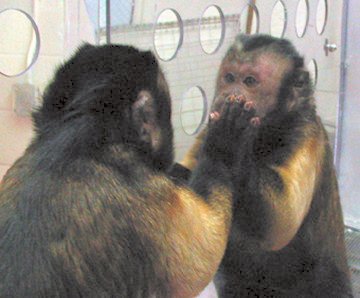Monkeys in the Mirror
Capuchin monkeys react to their own mirror images in surprising ways.
Share this:
- Share via email (Opens in new window) Email
- Click to share on Facebook (Opens in new window) Facebook
- Click to share on X (Opens in new window) X
- Click to share on Pinterest (Opens in new window) Pinterest
- Click to share on Reddit (Opens in new window) Reddit
- Share to Google Classroom (Opens in new window) Google Classroom
- Click to print (Opens in new window) Print
By Emily Sohn
Some days, when you view yourself in the mirror, you might look really good. Other days, you might not be so happy with what you see. Either way, you know who you’re looking at: You.
Capuchin monkeys have a different experience, a recent study discovered. When these little primates see themselves in a mirror, they know they are looking at something interesting. They’re just not exactly sure what it is.
 |
|
An adult male capuchin monkey touches his reflection. In the experiment, a mesh barrier separated the monkey from the mirror. |
| Marietta Dindo |
Scientists define an animal as “self-aware” if it touches a painted spot on its own face when it looks in a mirror. People start to recognize themselves in this way at around age 2. Apes and dolphins figure it out in adulthood. Most monkeys, on the other hand, ignore facial markings. They just don’t understand that the image in the mirror is their own.
To find out whether capuchins are self-aware, psychologist Frans B.M. de Waal of Emory University in Atlanta and his colleagues studied eight female and six male monkeys that live at a research facility in Georgia.
Each capuchin entered a test chamber, where it was presented with three different situations. In the first, the monkey saw an unfamiliar monkey of the same sex on the other side of a glass barrier and behind a mesh screen. In the second scenario, the capuchin saw a monkey of the same sex that it was familiar with. Finally, it confronted its own reflection in a mirror behind the screen. The tests lasted for 15 minutes. Each monkey faced each test scenario twice.
When monkeys saw other monkeys that they already knew, they didn’t do much. When shown an unfamiliar monkey, males made threatening gestures. Females looked nervous and avoided eye contact. These were all natural reactions.
When the monkeys saw their own reflections, however, something odd happened. Females looked into their own eyes and acted friendly. They swayed and smacked their lips, as if they were flirting. Males also made more eye contact with their reflections than they did with the animals in the other two scenarios. Unlike females, though, they squealed, curled up on the floor, tried to escape the chamber, and otherwise acted confused and distressed.
The study shows that capuchins have some medium level of self-awareness, de Waal concludes. They don’t quite see the image as another monkey. Nor do they see it as themselves.
Other experts disagree. It is possible, they say, that capuchins simply respond to mirrors as they would to another monkey who won’t stop imitating them. And everyone knows how flattering or annoying a copycat can be.—E. Sohn
Going Deeper:
Bower, Bruce. 2005. Reflections of primate minds: Mirror images strike monkeys as special. Science News 168(July 23):53-54. Available at http://www.sciencenews.org/articles/20050723/fob6.asp .







